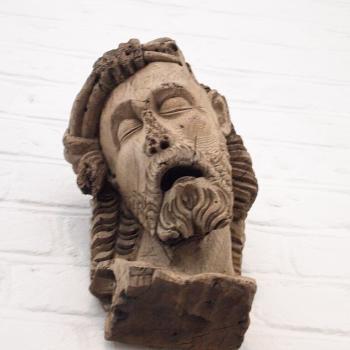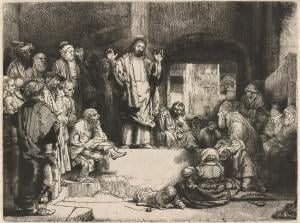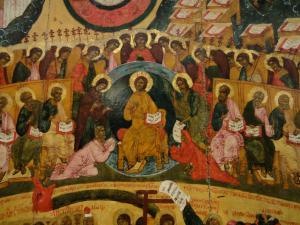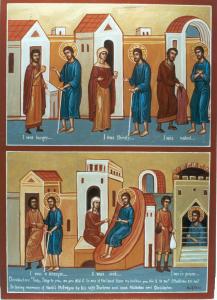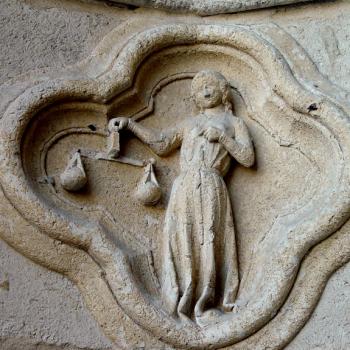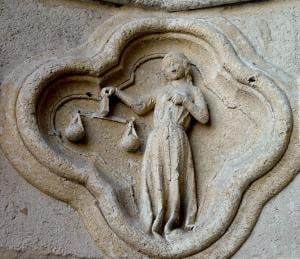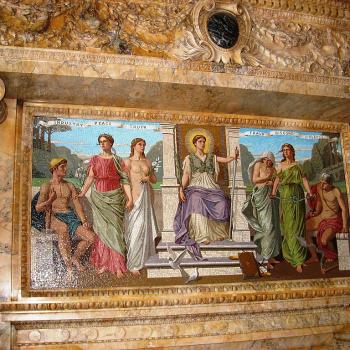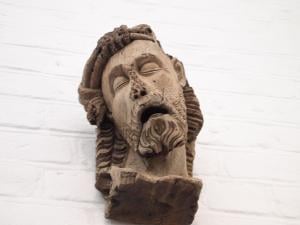
In a way, we can say life is suffering. This is not because life should be so filled with suffering that all we think about when we think about life is such suffering; rather, it is because suffering is all around us, and is something we will experience throughout our lives. Evil, both that which we do, and the evil which others do, creates the conditions for such suffering. “Evil is a world-wide fact; all natural life begins in violence and wickedness, goes on in suffering and servitude, and ends in death and putrid dissolution.” [1] Despite the suffering which we experience, life is a gift, a good which has been given to us. Not everything we experience in life is suffering. We also experience much joy and happiness in our lives. We were given life so that we can receive gift after gift, grace after grace, good after good, from God and from each other. Sadly, we have hindered all the good God intended for us, and for everyone else, through our sins (both personal and collective). Nonetheless, God continues to provide us opportunity after opportunity to receive various goods in our lives and use them to lead us to something greater, something far more glorious than we can presently imagine. Thus, while we can say life is suffering, we must recognize a part of it is due to our own faults, that we made it this way; what we do causes us and everyone else to suffer. It’s the consequences of our actions. To counter this, to counter the suffering which is the normative result of our evil actions, God chose to take on and share those consequences with us, to embrace our suffering, to experience and take on the burden of our actions for us; to do so, God became the least among us: “He chose to descend into the suffering, dying heart of humanity. He freely wished to become the poorest of the poor, the loneliest of all the abandoned human beings.” [2]
God’s love is what led God to create. God’s love has also made room for created subjects who have a will of their own, so that those subjects can make something of themselves instead of just being forced to become something which God made them to be. Sadly, we see much of what we do only makes us worse than God desires us to be. This is because we have embraced the poisons of pride, avarice, and hate. Because God still loves us, the second person of the Trinity “descended” into the world to enter into the world system and its structures of sin which we created. The God-man experiences it all in order to take control of and change it all from within. God confirmed its reality, going all the way to the realm of the dead, and to the edge of being itself, so as to show us what we established. Then, the God-man provides us a way to transcend the fallen world-system we created. It is possible if we embrace the God-man and join ourselves with him, so that in his resurrection from the dead, we can share with him the glory of the new state of being, one which transcends all the suffering and horror established by us through our sins.
God is victorious over death by taking on death itself. God is victorious against sin by overcoming and transcending the system which sin established in the world. It is a decisive victory, but it is an eschatological victory; and as it is an eschatological victory, it is one which can be experienced, in part, in time, while the fullness of that victory will be experienced by us as we enter into eternity. This is why only at the end of time will we see the full force of that victory. So long as we remain in the temporal order, we will see and experience the remnants of the system which we established, with all the suffering that comes with it:
However, the biblical view that God suffers us and his defeated the powers of evil decisively in the cross and resurrection of Jesus does not mean that suffering no longer exists. The New Testament is clear that though the decisive victory has been won on the cross and through the resurrection of Jesus, the war against evil and suffering is still going on. The final victory will take pace with the Second Coming of Christ. In the meantime, Christians are called to suffer with God in the fight against evil in the present age. [3]
There are many ways we can and will experience the kingdom of God in our lives, and with it, experience the eschatological victory of Christ. Some of us, like various mystics, experience it more than others, but all of us can find times of peace, of solace, of joy, times in which, if we are attentive, we can see the glory of the kingdom of God shining in our lives. We know the truth of the victory in our hearts, even if at times, we find ourselves having doubts as to what it means. We are called to live in and with the grace and experience of the kingdom of God which we can experience now, using it to help us act in the world, becoming vessels of the kingdom of God, helping establish more of its victory in in the world around us. We are to make the world a better place. Jesus truly called us to live in the world, to act in it, to be vessels of grace, and in doing so, following after him, doing good, healing those who need healing, feeding the hungry, comforting those in pain and sorrow, and in this way, we realize our place in his body and reveal his presence in the world:
There is little in the gospel message that suggests deferral, or even less, resting in the comfort of well-worked doctrines that give the illusion of timeless sureties. Rather, the message of the gospel commands the most down-to-earth realism: “I was naked and you closed me” (Matt. 25:35). The seriousness of the world – the seriousness of suffering and injustice – must claim our attention, must claim the work of our hearts and our hands.[4]
We have been given grace. We have been shown the truth faith. We worship the undivided Trinity. We glorify Christ and his resurrection from the dead. We receive the Holy Spirit. We partake of Christ’s body and blood. Our faith should influence us and all we do, including our political engagements:
All this requires Christians to live in ways which bring the powers of redemption which were wrought on the cross to bear on every area of practical politics, including and especially areas of human conflict and suffering. This is why they are enjoined to be active ‘peacemakers’ in the present and are not permitted to believe only that peace will occur in some Messianic future. For this reason, peacemaking is a central Christian obligation.[5]
If we are unconcerned with injustices, with those suffering, especially the suffering of the poor and vulnerable, we have not yet put our faith into practice. If we are not trying to bring forth a just peace in the world, we are not properly acting upon the expectations of the Christian faith. We have heard the Sermon on the Mount countless times; do we think we can ignore its implications? We have listened to the Gospels in which Jesus blesses the poor and warn about the evils the rich face if they do not change their ways; why do we think nothing of what we have heard? We have been told of the way Jesus fed the hungry and healed the sick without charging them, why, then, do we think we can provide both for a fee, a fee which those most in need cannot afford? Let us remember Christ took the sins of the world and cast them into the “pit of hell.” What do we think will happen if we remain attached to sin, especially the sins which cry out to heaven?
He who despises the sick will not see light, and the day of him who turns his face from a man straitened by affliction will become darkness; and he who scorns the voice of one suffering hardship, the sons of his house will grope their way in blindness. [6]
Let us, therefore, not despise the sick, the suffering, the poor, the vulnerable, but cherish them as Christ cherished them. Let us make sure all our engagements in the world, including our political engagements, reflect this. Let us live out our faith, showing and proving our faith with our deeds. Let us be the sign of God’s healing and love in the world. It is, after all, what Christ said we should do if we are to be his disciples. Why do so many think otherwise?
[1] Vladimir Solovyey, God, Man & The Church. The Spiritual Foundations Of Life. Trans. Donald Attwater (Cambridge: James Clarke & Co., 2016), 54.
[2] George A. Maloney, SJ, The Everlasting Now (Notre Dame, IN: Ave Maria Press, 1980), 27.
[3] James H. Cone, God Of The Oppressed (New York: Seabury Press 1975), 177.
[4] Terry A. Veling, Practical Theology (Maryknoll, NY: Orbis Books. 2005), 41.
[5] R. John Elford, “Christianity and war” in The Cambridge Companion to Christian Ethics. Ed. Robin Gill (Cambridge: Cambridge University Press, 2001), 112.
[6] Saint Isaac the Syrian, The Ascetical Homilies of Saint Isaac the Syrian. Trans. Monks of the Holy Transfiguration Monastery. Rev. 2nd ed (Boston, MA: Holy Transfiguration Monastery, 2011), 532 [Homily 76].
Stay in touch! Like A Little Bit of Nothing on Facebook.
If you liked what you read, please consider sharing it with your friends and family!
N.B.: While I read comments to moderate them, I rarely respond to them. If I don’t respond to your comment directly, don’t assume I am unthankful for it. I appreciate it. But I want readers to feel free to ask questions, and hopefully, dialogue with each other. I have shared what I wanted to say, though some responses will get a brief reply by me, or, if I find it interesting and something I can engage fully, as the foundation for another post. I have had many posts inspired or improved upon thanks to my readers.


